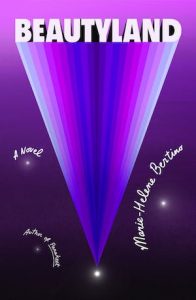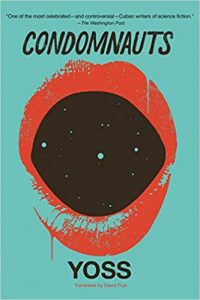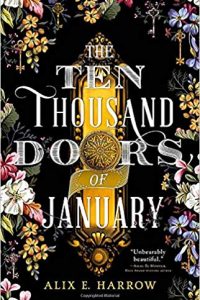Ian Mond Reviews Beautyland by Marie Helene Bertino
 Beautyland, Marie-Helene Bertino (Farrar, Straus, Giroux 978-0-37410-928-8, $28.00, 336pp, hc) January 2024.
Beautyland, Marie-Helene Bertino (Farrar, Straus, Giroux 978-0-37410-928-8, $28.00, 336pp, hc) January 2024.
While reading Marie-Helene Bertino’s offbeat third novel, Beautyland, I was regularly reminded of the work of other authors. The central premise – the narrator believes she’s from another planet – brought to mind Sayaka Murata’s 2020 novel Earthlings. As a first-contact novel that reshapes rather than subverts the trope, it bears similarity with Adam Soto’s This Weightless World. Stylistically, the book has trace elements of Kurt Vonnegut – especially the observational humour. And while it’s not literature, I’d be lying if I didn’t admit that Mork and Mindy popped into my head occasionally (and so would have, I’m sure, The Man Who Fell to Earth if I’d seen the film). This all seems to suggest that Beautyland lacks originality. On the contrary, it’s a singular novel with a singular protagonist who has a singular view of the world. If anything, the resonance with other works only adds a textural layer to a wonderfully quirky, funny, bittersweet novel.
It’s September 1977, and in a very amusing and lyrical opening, which references Star Wars – ‘‘a civil war movie set in space’’ – and the Price is Right contestant who lost her tube top while ‘‘bounding to the stage’’ (I had to look this up, yep this most definitely happened), we’re told that two celestial events occur simultaneously: the launch of Voyager 1 and the birth of Adina Giorno. The former has been sent into the vast reaches of space, with its 12-inch gold-plated disk containing sounds and images (but not the Beatles!) to introduce humans to extraterrestrial life. The latter, also a probe but in the shape of a child, has been sent by aliens ‘‘in the approximate vicinity of the bright star Vega, in the northern constellation of Lyra’’ to report back on humanity. Adina doesn’t activate until she’s four years old. Her father, whom, after this event, she won’t see again until she reaches adulthood, pushes Adina, who hits her head on the concrete steps. That night, she ‘‘awakes’’ in a classroom designed by her progenitors where they communicate Adina’s mission – to determine whether Earth is a suitable replacement for their dying home world: Planet Cricket Rice (the closest approximation of its name using English). And how will she report back? By fax machine, of course. The story spins out from there, chronicling Adina’s childhood and teenage years in Pennsylvania, living with her mother, Terese, who barely makes ends meet, her friendship with Toni and Toni’s older brother Dominic, and her obsession with Carl Sagan and Philip Glass. All of it, including Adina’s move to New York, where a fame of sorts awaits her, is documented for her extraterrestrial family, sent via the whirr and screech of the fax machine.
Beautyland, named after the ‘‘dash-to-in-a-pinch supply’’ store that, along with Auto World’s floppy inflatable man, are totems from Adina’s childhood, is written in a dry, matter-of-fact style, befitting of a novel where the protagonist sends daily memos to a home world she’s never seen. But it’s not dull. Most certainly not. I could easily spend the rest of this review quoting Adina’s hilarious, poetic, and wise observations. Here’s a selection: ‘‘I require speech lessons and corrective lenses and most likely teeth braces. I am an expensive extraterrestrial’’ / ‘‘Adulthood seems like a yearslong equation to beat traffic’’/ ‘‘The ego of the human male is by far the most dangerous aspect of human society’’ (to which the aliens respond: THIS HAS BEEN WELL DOCUMENTED) / ‘‘Death’s biggest surprise is that it does not end the conversation.’’ My favourite line from the novel isn’t from a fax, but rather: ‘‘Adina smiles at the girl in the mirror. The girl in the mirror, bound by physics, returns her smile.’’ It somehow typifies everything brilliant about Adina and this book. My favourite passage – too long to quote here – is Adina’s astonishing ode to the ‘‘signs of class’’ (‘‘What time you eat dinner is a sign of class… whether you can eat dinner is a sign of class… Your name is a sign of class’’).
Beautyland is a New York novel (a subgenre all on its own). I can’t say whether it’s a great New York novel, given I’ve spent less than two months there (although I did chuckle at the digression on ‘‘Alternate Side Parking regulations’’). But even based on my short stay in a ratty YMCA during the late ’90s, Bertino nails the sensation of oppressive loneliness that a city of nine million people can exude. New York, though, isn’t entirely to blame for Adina’s feelings of isolation. Since her activation as a child, she has been the proverbial square peg. Even her relationships with Toni and Dominic have an awkwardness, a sense that Adina speaks at a frequency they can only sometimes tune into. As such, the faxes become Adina’s lifeline, less a mission report and more a medium to express her authentic self.
True, Beautyland is sometimes a sad novel, threaded with Adina’s longing to find a home, to not be viewed as an outsider looking in. But it’s also a very funny and empathetic book that unravels the contradictions, complexities, and weirdness of this thing we call life.
Ian Mond loves to talk about books. For eight years he co-hosted a book podcast, The Writer and the Critic, with Kirstyn McDermott. Recently he has revived his blog, The Hysterical Hamster, and is again posting mostly vulgar reviews on an eclectic range of literary and genre novels. You can also follow Ian on Twitter (@Mondyboy) or contact him at mondyboy74@gmail.com.
This review and more like it in the December and January 2023 issue of Locus.
 While you are here, please take a moment to support Locus with a one-time or recurring donation. We rely on reader donations to keep the magazine and site going, and would like to keep the site paywall free, but WE NEED YOUR FINANCIAL SUPPORT to continue quality coverage of the science fiction and fantasy field.
While you are here, please take a moment to support Locus with a one-time or recurring donation. We rely on reader donations to keep the magazine and site going, and would like to keep the site paywall free, but WE NEED YOUR FINANCIAL SUPPORT to continue quality coverage of the science fiction and fantasy field.
©Locus Magazine. Copyrighted material may not be republished without permission of LSFF.






